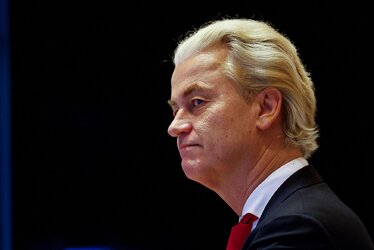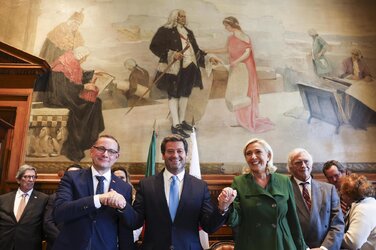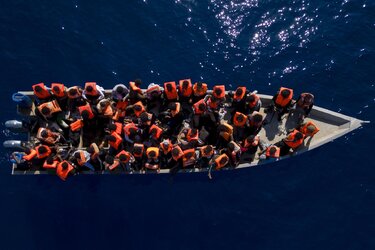Dutch election shows far right rising and reshaping Europe
The Washington Post (archive.ph)
By Anthony Faiola, Emily Rauhala, and Loveday Morris
2023-11-25 13:05:56GMT

Dutch far-right leader Geert Wilders finished in a surprise first place in this week's election. (Piroschka Van De Wouw/Reuters)
When Austria two decades ago became the first nation in Western Europe to lurch to the far right since World War II, the rest of the continent roared in outrage. Protesters haunted its politicians. Diplomats shunned them. One Belgian delegate skipped a lunch with Austria’s then-defense minister, telling reporters: “I don’t eat with fascists.”
Fast forward to 2023, when historic political momentum has given the far right a seat at Europe’s table and a chance to reshape the region’s politics and policies.
The latest victory came in the socially liberal Netherlands, where hard-right icon Geert Wilders and his anti-European Union, anti-Muslim and anti-immigration Party for Freedom landed a shocking first place finish this week in parliamentary elections.
Wilders is expected to struggle, and ultimately may fail, to form a government — his party fell well short of a majority and faces weeks or months of complex negotiations. But the unexpectedly strong showing by the “Dutch Donald Trump,” who has long pledged to ban the Quran and halt acceptance of asylum seekers, amounted to a powerful warning to mainstream Europe. And it was duly welcomed by the region’s leading voices of the far right, including Hungarian Prime Minister Viktor Orban and French opposition leader Marine Le Pen.
“Everywhere in Europe we see the same right-wing wind blowing,” Tom Van Grieken, a Belgian hard-right populist, said in response to Wilders’s win. “The advance that has been underway for a while is clearly continuing in the Netherlands. We share our patriotism and want to put our people first again. Nothing can match that motivation.”

Geert Wilders celebrates with Party for Freedom members after winning the most votes in the Dutch election. (Phil Nijhuis/AP)
Wilders’s success, while shaped in part by domestic conditions, has further buoyed the global hard right, days after Javier Milei, a far-right economist and former television pundit, was elected president in Argentina.
Ahead of next year’s elections in the United States — where Trump is seen as a close ally of Europe’s anti-migrant, right-wing nationalists — the ascendancy of the far right in Europe is being closely watched as a bellwether of voter rage against traditional politicians in the West.
“It has been a trend for a long time, but it seems to be gathering steam,” said Catherine Fieschi, a political analyst and fellow at the Robert Schuman Center of the European University Institute in Florence and the author of a book on populism.
Far-right parties have taken power in Italy, extended their rule in Hungary, earned a coalition role in Finland, become de facto government partners in Sweden, entered Parliament in Greece and made striking gains in regional elections in Austria and Germany. Slovakia is also something of a far-right success story, with the far-right Slovak National Party among the coalition partners supporting populist Robert Fico — who hails from the far left but opposes migration and LGBTQ rights.
The European far right has seen setbacks, too, this year. The biggest was in Poland, where the centrist opposition is set to oust the Law and Justice party that stood as a pillar of hard-right thought. And in Spain, the populist Vox party lost more than half of its seats in parliament.
But analysts say far-right parties have now become major political forces in a majority of E.U. countries and are influencing policy even in nations where they do not govern.

From left, Tino Chrupalla of the far-right Alternative for Germany, Andre Chega of the populist Portuguese party Chega and French far-right leader Marine Le Pen meet in Lisbon on Friday as members of Europe's Identity and Democracy alliance. (Jose Sena Goulao/EPA-EFE/Shutterstock)
Consider the issue of climate change. The far right’s denunciation of ambitious climate pledges as damaging to working classes has shifted the debate in Europe and slowed parts of the green transition. Sweden’s government is cutting taxes on gas and diesel, and backing away from a levy on plastic bags. Britain’s Conservative Party government announced it would delay a ban all on sales of new internal combustion engine vehicles. In Germany, the government was pressured to dilute a sweeping bill seeking to ban fossil-fuel-burning boilers.
Wilders’s victory in Europe’s last big election of the year has renewed concern — or hope, depending on your perspective — that the far right could gain clout or become kingmakers in next spring’s European Parliament elections, with ramifications for the E.U.’s stance on migration, LGBTQ and reproductive rights, climate action and support for Ukraine.
How Europe’s far right became mainstream

Members of the Identity and Democracy alliance meet in Lisbon on Friday. (Tiago Petinga/EPA-EFE/Shutterstock)
The far right in Europe has been growing in fits and starts for decades. As in many places, it struggled for relevance during the pandemic. But it is now being rocket-fueled by high inflation, fallout from the war in Ukraine, surging migration, rising inequality and the perceived failure of the traditional political class.
Europe’s far right has sought to clean up its image, trading skinhead attire for suits. Far-right politicians have also tried to expand their appeal by reining in their most inflammatory rhetoric. The model is less the combative Orban and more Italian Prime Minister Giorgia Meloni, who this year joined the small club of foreign hard-right leaders who have visited the Biden White House.
Wilders’s party is still unabashedly anti-Islam. Its manifesto includes the line: “The Netherlands is not an Islamic country: no Islamic schools, Qurans or mosques.” But analysts said he learned from other far-right parties in Europe about the benefits of focusing on bread-and-butter issues.
Elsewhere, flashes of the far right’s antisemitic origins remain. But politicians who voice such views may see their careers suffer for it. In June, Vilhelm Junnila of the far-right Finns Party — now a member of the governing coalition — was forced to step down after just 10 days in office amid allegations that he had made pro-Nazi references at a 2019 conference.
Meanwhile, hard-right leaders across Europe have emerged as some of the strongest backers of Israel in the current conflict in Gaza.

Italian Prime Minister Giorgia Meloni has established herself as a star of the far right in Europe. (Odd Andersen/AFP/Getty Images)
A Wilders-led government would be a headache for the E.U. His party’s platform calls for a binding “Nexit” referendum — an even messier prospect than Brexit, since the Netherlands shares two land borders and a common currency with other countries in the bloc. Analysts anticipate that he would probably have to drop that demand in negotiations for coalition partners.
Beyond the Netherlands, since Brexit was seen to have done Britain more harm than good, far-right agitation to leave the E.U. has quieted, replaced by demands for a more hands-off union.
“Today, they all love the single market,” said Rosa Balfour, director of Carnegie Europe. “They are taking their cue a bit from Viktor Orban. They don’t want a common foreign policy. They don’t want interference on [limiting] the rule of law. But they want the E.U’s money.”
How Europe’s mainstream shifted right

Migrants from Eritrea, Libya and Sudan sail a wooden boat before being assisted by aid workers of the Spanish nongovernmental organization Open Arms, in the Mediterranean sea, on June 17. (Joan Mateu Parra/AP)
The Dutch election highlights how centrist politicians have been responding to the far-right surge by moving closer to far-right positions. In many cases, that has only further helped their more radical challengers.
Simon Otjes, an assistant professor at Leiden University who studies Dutch politics, said the center right in the Netherlands tried to attract voters by making the campaign about migration. But by doing that, he said, they “played into the hands” of the far right, handing them votes.
The same sort of efforts to co-opt far-right talking points have been happening across Europe, analysts said.
“On issues the far right sees as most important in Europe — immigration, crime committed by immigrants, the multicultural society, the western debate on gender, more traditional views on families — many other parties have now adapted to their rhetoric,” said Ann-Cathrine Junger, a political scientist at Sweden’s Södertörn University. “Far-right parties and their agendas have entered the mainstream. They are the new normal.”
That’s especially true on migration policies.
The number of migrants entering Europe this year soared to levels not seen since 2016, amplifying the far right’s rallying cry against migrants and prodding mainstream politicians toward harder lines. After extended debate, E.U. nations have backed changes to the bloc’s migration rules that could get final approval as soon as early next year. Front-line countries such as Italy and Greece could send more migrants to other countries — or be paid by those that refuse. Importantly, deportations could be sped up and detention times extended.
At the country level, among the far-right political groups that have successfully pushed a harder stance on migration are the Sweden Democrats, who are not part of the coalition government, but nevertheless influence it through a political agreement.
Urged on by the Sweden Democrats, the government proposed an overhaul of immigration laws that would do away with permanent visas for asylum seekers and set higher bars for temporary ones. The government wants to compel municipalities and public authorities to report illegal migrants. Asylum seekers already in the country would be given information — and encouragement — to leave. Last week, the government announced it would study ways to deport asylum seekers for not only committing crimes, but also having unpaid debts or taking action that undermined the country’s democracy.
“A basic condition for successful integration is that people who want to live in Sweden respect basic norms and live in an honest and orderly manner,” Sweden’s Migration Minister Maria Malmer Stenergard told reporters.
In Italy, where Meloni leads the most right-wing government since the end of World War II, a campaign pledge to curb migration remains unfulfilled — the country this year received the highest number of irregular arrivals since a regional migrant crisis in 2016.
But the government is moving to make Italy less of a migration destination. “During the last 10 years, we witnessed center-left governments [who were] fanatics of the no-border theory, who did not concern themselves with adapting to a changing situation,” said Sara Kelany, a lawmaker for Meloni’s Brothers of Italy party and its lead on migration in the lower house. “Under Meloni, that is changing.”
Her government has authorized a doubling of “repatriation camps” from 10 to 20. Irregular migrants, previously held for a maximum of 90 days, will now face detentions for up 18 months. Deportations have increased 30 percent so far this year to roughly 2,600, compared to last, according to Kelany.
This week, Meloni’s government also said it would present a bill to ratify a controversial agreement with Albania to set up offshore holding centers for migrants picked up by the Italian coast guard at sea. Such camps could hold as many as 3,000 migrants at a time.
In France, nationalist Le Pen has lost three presidential elections. But as she climbed in the polls again ahead of a still-distant 2027 election, the center-right government of President Emmanuel Macron sought stricter rules on her pet policy: migration.
Fieschi warned that for centrists, co-opting far-right positions is often not a winning strategy.
“If the mainstream right starts behaving like the populist right, they don’t get extra votes, but the populist right certainly does,” she said. “Somehow, the mainstream parties never learn.”
The Washington Post (archive.ph)
By Anthony Faiola, Emily Rauhala, and Loveday Morris
2023-11-25 13:05:56GMT

Dutch far-right leader Geert Wilders finished in a surprise first place in this week's election. (Piroschka Van De Wouw/Reuters)
When Austria two decades ago became the first nation in Western Europe to lurch to the far right since World War II, the rest of the continent roared in outrage. Protesters haunted its politicians. Diplomats shunned them. One Belgian delegate skipped a lunch with Austria’s then-defense minister, telling reporters: “I don’t eat with fascists.”
Fast forward to 2023, when historic political momentum has given the far right a seat at Europe’s table and a chance to reshape the region’s politics and policies.
The latest victory came in the socially liberal Netherlands, where hard-right icon Geert Wilders and his anti-European Union, anti-Muslim and anti-immigration Party for Freedom landed a shocking first place finish this week in parliamentary elections.
Wilders is expected to struggle, and ultimately may fail, to form a government — his party fell well short of a majority and faces weeks or months of complex negotiations. But the unexpectedly strong showing by the “Dutch Donald Trump,” who has long pledged to ban the Quran and halt acceptance of asylum seekers, amounted to a powerful warning to mainstream Europe. And it was duly welcomed by the region’s leading voices of the far right, including Hungarian Prime Minister Viktor Orban and French opposition leader Marine Le Pen.
“Everywhere in Europe we see the same right-wing wind blowing,” Tom Van Grieken, a Belgian hard-right populist, said in response to Wilders’s win. “The advance that has been underway for a while is clearly continuing in the Netherlands. We share our patriotism and want to put our people first again. Nothing can match that motivation.”

Geert Wilders celebrates with Party for Freedom members after winning the most votes in the Dutch election. (Phil Nijhuis/AP)
Wilders’s success, while shaped in part by domestic conditions, has further buoyed the global hard right, days after Javier Milei, a far-right economist and former television pundit, was elected president in Argentina.
Ahead of next year’s elections in the United States — where Trump is seen as a close ally of Europe’s anti-migrant, right-wing nationalists — the ascendancy of the far right in Europe is being closely watched as a bellwether of voter rage against traditional politicians in the West.
“It has been a trend for a long time, but it seems to be gathering steam,” said Catherine Fieschi, a political analyst and fellow at the Robert Schuman Center of the European University Institute in Florence and the author of a book on populism.
Far-right parties have taken power in Italy, extended their rule in Hungary, earned a coalition role in Finland, become de facto government partners in Sweden, entered Parliament in Greece and made striking gains in regional elections in Austria and Germany. Slovakia is also something of a far-right success story, with the far-right Slovak National Party among the coalition partners supporting populist Robert Fico — who hails from the far left but opposes migration and LGBTQ rights.
The European far right has seen setbacks, too, this year. The biggest was in Poland, where the centrist opposition is set to oust the Law and Justice party that stood as a pillar of hard-right thought. And in Spain, the populist Vox party lost more than half of its seats in parliament.
But analysts say far-right parties have now become major political forces in a majority of E.U. countries and are influencing policy even in nations where they do not govern.

From left, Tino Chrupalla of the far-right Alternative for Germany, Andre Chega of the populist Portuguese party Chega and French far-right leader Marine Le Pen meet in Lisbon on Friday as members of Europe's Identity and Democracy alliance. (Jose Sena Goulao/EPA-EFE/Shutterstock)
Consider the issue of climate change. The far right’s denunciation of ambitious climate pledges as damaging to working classes has shifted the debate in Europe and slowed parts of the green transition. Sweden’s government is cutting taxes on gas and diesel, and backing away from a levy on plastic bags. Britain’s Conservative Party government announced it would delay a ban all on sales of new internal combustion engine vehicles. In Germany, the government was pressured to dilute a sweeping bill seeking to ban fossil-fuel-burning boilers.
Wilders’s victory in Europe’s last big election of the year has renewed concern — or hope, depending on your perspective — that the far right could gain clout or become kingmakers in next spring’s European Parliament elections, with ramifications for the E.U.’s stance on migration, LGBTQ and reproductive rights, climate action and support for Ukraine.
How Europe’s far right became mainstream

Members of the Identity and Democracy alliance meet in Lisbon on Friday. (Tiago Petinga/EPA-EFE/Shutterstock)
The far right in Europe has been growing in fits and starts for decades. As in many places, it struggled for relevance during the pandemic. But it is now being rocket-fueled by high inflation, fallout from the war in Ukraine, surging migration, rising inequality and the perceived failure of the traditional political class.
Europe’s far right has sought to clean up its image, trading skinhead attire for suits. Far-right politicians have also tried to expand their appeal by reining in their most inflammatory rhetoric. The model is less the combative Orban and more Italian Prime Minister Giorgia Meloni, who this year joined the small club of foreign hard-right leaders who have visited the Biden White House.
Wilders’s party is still unabashedly anti-Islam. Its manifesto includes the line: “The Netherlands is not an Islamic country: no Islamic schools, Qurans or mosques.” But analysts said he learned from other far-right parties in Europe about the benefits of focusing on bread-and-butter issues.
Elsewhere, flashes of the far right’s antisemitic origins remain. But politicians who voice such views may see their careers suffer for it. In June, Vilhelm Junnila of the far-right Finns Party — now a member of the governing coalition — was forced to step down after just 10 days in office amid allegations that he had made pro-Nazi references at a 2019 conference.
Meanwhile, hard-right leaders across Europe have emerged as some of the strongest backers of Israel in the current conflict in Gaza.

Italian Prime Minister Giorgia Meloni has established herself as a star of the far right in Europe. (Odd Andersen/AFP/Getty Images)
A Wilders-led government would be a headache for the E.U. His party’s platform calls for a binding “Nexit” referendum — an even messier prospect than Brexit, since the Netherlands shares two land borders and a common currency with other countries in the bloc. Analysts anticipate that he would probably have to drop that demand in negotiations for coalition partners.
Beyond the Netherlands, since Brexit was seen to have done Britain more harm than good, far-right agitation to leave the E.U. has quieted, replaced by demands for a more hands-off union.
“Today, they all love the single market,” said Rosa Balfour, director of Carnegie Europe. “They are taking their cue a bit from Viktor Orban. They don’t want a common foreign policy. They don’t want interference on [limiting] the rule of law. But they want the E.U’s money.”
How Europe’s mainstream shifted right

Migrants from Eritrea, Libya and Sudan sail a wooden boat before being assisted by aid workers of the Spanish nongovernmental organization Open Arms, in the Mediterranean sea, on June 17. (Joan Mateu Parra/AP)
The Dutch election highlights how centrist politicians have been responding to the far-right surge by moving closer to far-right positions. In many cases, that has only further helped their more radical challengers.
Simon Otjes, an assistant professor at Leiden University who studies Dutch politics, said the center right in the Netherlands tried to attract voters by making the campaign about migration. But by doing that, he said, they “played into the hands” of the far right, handing them votes.
The same sort of efforts to co-opt far-right talking points have been happening across Europe, analysts said.
“On issues the far right sees as most important in Europe — immigration, crime committed by immigrants, the multicultural society, the western debate on gender, more traditional views on families — many other parties have now adapted to their rhetoric,” said Ann-Cathrine Junger, a political scientist at Sweden’s Södertörn University. “Far-right parties and their agendas have entered the mainstream. They are the new normal.”
That’s especially true on migration policies.
The number of migrants entering Europe this year soared to levels not seen since 2016, amplifying the far right’s rallying cry against migrants and prodding mainstream politicians toward harder lines. After extended debate, E.U. nations have backed changes to the bloc’s migration rules that could get final approval as soon as early next year. Front-line countries such as Italy and Greece could send more migrants to other countries — or be paid by those that refuse. Importantly, deportations could be sped up and detention times extended.
At the country level, among the far-right political groups that have successfully pushed a harder stance on migration are the Sweden Democrats, who are not part of the coalition government, but nevertheless influence it through a political agreement.
Urged on by the Sweden Democrats, the government proposed an overhaul of immigration laws that would do away with permanent visas for asylum seekers and set higher bars for temporary ones. The government wants to compel municipalities and public authorities to report illegal migrants. Asylum seekers already in the country would be given information — and encouragement — to leave. Last week, the government announced it would study ways to deport asylum seekers for not only committing crimes, but also having unpaid debts or taking action that undermined the country’s democracy.
“A basic condition for successful integration is that people who want to live in Sweden respect basic norms and live in an honest and orderly manner,” Sweden’s Migration Minister Maria Malmer Stenergard told reporters.
In Italy, where Meloni leads the most right-wing government since the end of World War II, a campaign pledge to curb migration remains unfulfilled — the country this year received the highest number of irregular arrivals since a regional migrant crisis in 2016.
But the government is moving to make Italy less of a migration destination. “During the last 10 years, we witnessed center-left governments [who were] fanatics of the no-border theory, who did not concern themselves with adapting to a changing situation,” said Sara Kelany, a lawmaker for Meloni’s Brothers of Italy party and its lead on migration in the lower house. “Under Meloni, that is changing.”
Her government has authorized a doubling of “repatriation camps” from 10 to 20. Irregular migrants, previously held for a maximum of 90 days, will now face detentions for up 18 months. Deportations have increased 30 percent so far this year to roughly 2,600, compared to last, according to Kelany.
This week, Meloni’s government also said it would present a bill to ratify a controversial agreement with Albania to set up offshore holding centers for migrants picked up by the Italian coast guard at sea. Such camps could hold as many as 3,000 migrants at a time.
In France, nationalist Le Pen has lost three presidential elections. But as she climbed in the polls again ahead of a still-distant 2027 election, the center-right government of President Emmanuel Macron sought stricter rules on her pet policy: migration.
Fieschi warned that for centrists, co-opting far-right positions is often not a winning strategy.
“If the mainstream right starts behaving like the populist right, they don’t get extra votes, but the populist right certainly does,” she said. “Somehow, the mainstream parties never learn.”